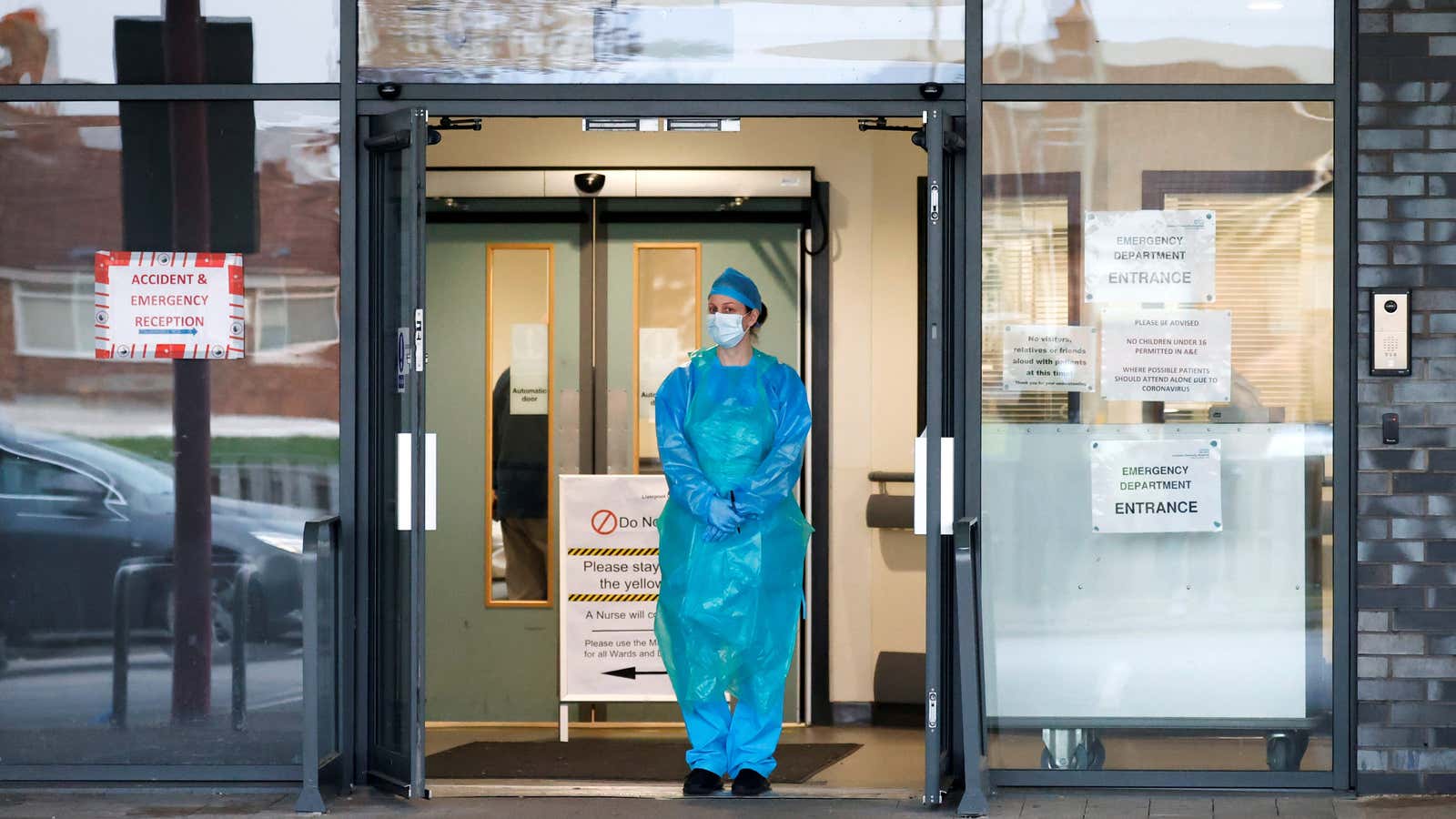Every day, about one thousand new cases of cancer are diagnosed in the UK. This means that, in the seven weeks since the UK shut down to contain coronavirus, roughly 50,000 people should have found out they had cancer.
Instead, oncologists and pathology labs across the country have only caught about 10% of those cases, estimates Karol Sikora, the chief medical officer at the Rutherford Cancer Centers in the UK.
Tens of thousands of patients with potentially fatal illnesses are slipping through the cracks of a healthcare system laser-focused on treating Covid-19. It’s not just cancer: Cardiologists and other healthcare professionals are also sounding the alarm. People have been told to stay at home, so they are not coming into hospitals for checkups or visiting emergency rooms if they feel ill. In April, doctors postponed more than 2 million surgeries to free up 12,000 beds for coronavirus patients, at a potential cost of £3 billion ($3.7 billion).
Specialists say all this has caused a backlog of cases, and that backlog will come at a human cost: Cancers, for instance, can become more lethal and harder to treat as time goes on. “If the delay is only a month, not much happens,” Sikora said. “If the delay is six months, then a lot of stage one patients convert to three and four stages, which means their chances of survival, even with optimal care, are much less.”
Meanwhile, there has been a significant drop in patients going to emergency rooms for heart attacks and other cardiovascular problems across the UK. Robin Choudhury, a professor of cardiovascular medicine at the University of Oxford, thinks it’s because some patients are being misdiagnosed—either by emergency responders, their own physicians over the phone, or are misdiagnosing themselves (heart attacks can be hard to detect, even when we’re having them). Some patients may also be scared of catching coronavirus if they go to an emergency room, even if they feel like something is wrong.
Unlike cancers, heart attacks are immediate emergencies. Every minute that goes by without treatment after someone has a heart attack decreases their chances of survival and of living a healthy life afterwards. “With cancer, you’re getting the ticking time bomb, but it’s a relatively slow burn,” Choudhury said. “Even though you want to diagnose early and treat early, there’s an opportunity to store up problems for the future. In a cardiology emergency, the problem is now.”
Cancers and cardiovascular diseases are among the leading causes of death in the UK.
That’s why, on April 29, two executives at the National Health Service (NHS) in England asked all NHS chiefs in a letter (pdf)(p. 5) “to step up non-Covid-19 urgent services as soon as possible over the next six weeks.” They emphasized that “urgent and time-critical surgery and non-surgical procedures” should be provided “at pre-Covid-19 levels of capacity,” and that routine elective procedures should resume where possible.
This will take some time. Choudhury argues that hospitals should leverage new technologies, including telemedicine, to prioritize care, and treat the most urgent cases first, while encouraging people who feel sick to come into hospitals. (Incidentally, he says, this could usher in a fundamental shift in the way the NHS delivers care.) “I don’t think we are at normal, and we can’t pretend we’re in normal times,” he said.
There are a few important caveats: First, the data is either preliminary or anecdotal, and it will be months or years before anyone can assess the full effect that shifting most NHS resources to the Covid-19 response had on patients with other illnesses. Cancer Research UK, for example, believes that about 2,000 new cases of cancer are being missed each week, a more conservative figure than the one Sikora put forward. Secondly, the dynamics are different for patients who live in areas of the UK less affected by Covid-19.
Still, experts believe the excess deaths caused by undiagnosed illnesses will be greater than those ultimately caused by the pandemic. There are also other serious conditions that healthcare professionals say are going undetected or untreated, like psychiatric or geriatric emergencies. Hospitals have delayed all non-urgent or routine procedures for at least three months, including some that have a huge positive effect on people’s lives, like knee replacements or cataract surgeries.
Even before this pandemic, the NHS was under-staffed and under-funded, critics say. Patients with urgent needs could wait a long time to receive care, with worse results on average than similar European countries. It’s a system with “no buffer for any emergencies,” Sikora said. “There isn’t the capacity for recovery.”
